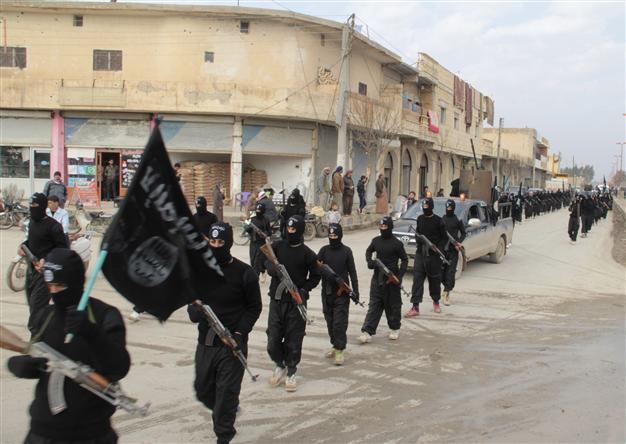Israeli general accuses Turkey of sheltering al-Qaeda's Syria fighters
TEL AVIV - Reuters

Fighters of al-Qaeda linked Islamic State of Iraq and the Levant parade at Syrian town of Tel Abyad. REUTERS photo
Some of the al-Qaeda militants going to fight in Syria have bases in neighbouring Turkey and can easily access Europe from the NATO member state, Israel's military intelligence chief said on Jan. 29.Major-General Aviv Kochavi, presenting a map of the Middle East marked with areas of al-Qaeda presence, told a security conference al-Qaeda fighters from around the world entered Syria weekly, "but they do not stay" there.
The map showed three al-Qaeda bases inside Turkey. A spokesman for the Turkish Foreign Ministry had no immediate comment, but Prime Minister Recep Tayyip Erdoğan has repeatedly denied Turkey is providing shelter or backing to al-Qaeda-linked groups in Syria.
Kochavi declined a request by Reuters to give specific numbers, but his spokeswoman said the map showed the relative strength and location of al-Qaeda bases, which appeared to be in the Karaman, Osmaniye and Şanlıurfa provinces.
"Syria is projecting its conflict to the whole region. Those blotches (on the map) in Turkey are no mistake by the graphic artist and it is a short way from there into Europe," Kochavi said at the conference held by the Institute for National Security Studies in Tel Aviv.
The spots on the map signifying al Qaeda in Turkey were together about half the size of the blotch in the Egyptian Sinai peninsula, which Kochavi said was home to about 200 Jihadi militants.
Turkish anti-terrorist police raided the offices of an aid agency on the border with Syria this month, as part of what Turkish media said was an operation in six cities against individuals suspected of links to al Qaeda.
Turkey has maintained an open-door policy throughout the Syrian conflict, providing a lifeline to rebel-held areas by allowing humanitarian aid in, giving refugees a route out and letting the rebel Free Syrian Army organise on its soil.
But the rise of al-Qaeda-linked groups such as Jabhat al-Nusra and the Islamic State of Iraq and the Levant (ISIL) in parts of northern Syria near the border has left Ankara open to accusations it is lending support to radical Islamists.
















